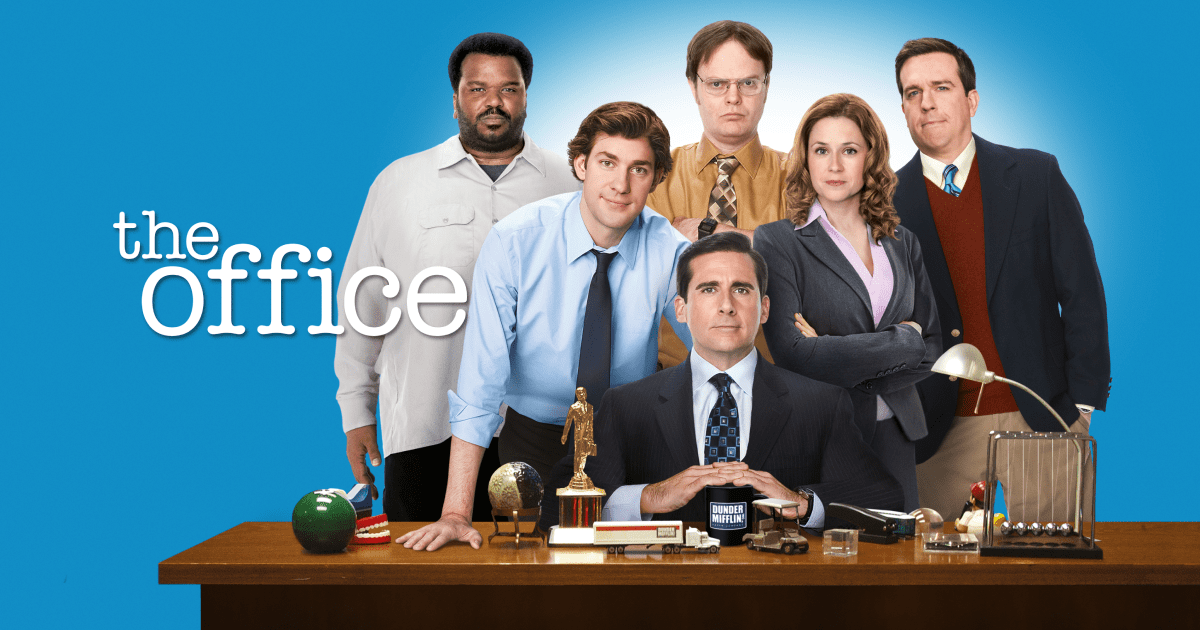About The Office
Bears. Beats. Battlestar Galactica.
The Office is an American mockumentary sitcom television series that depicts the everyday work lives of office employees at the Scranton, Pennsylvania branch of the fictional the company Dunder Mifflin Paper Company.
Maybe at first glance, the comparison between The Office and the trade show world seems a bit unusual, but we are all about taking knowledge from a variety of sources (especially funny TV and talk shows). So through Michael Scott and the rest of the Dunder Mifflin gang, let’s get 9 kernels of truth about trade shows:
#1 Preparation
“My perfect Valentine's Day? I'm at home, three cell phones in front of me, fielding desperate calls from people who want to buy one of the fifty restaurant reservations I made over six months ago.” —Dwight Schrute, Season 7: PDA
You gotta admit: this is pretty genius, if not a little crazy (classic Dwight). This takes well-thought-out planning and execution. Dwight is thinking at least six months ahead of everyone else, and he would end up reaping serious monetary rewards because of it. In the competitive trade show world, you should take this prepared Dwight approach. Planning for booths and marketing materials typically happens long before the show, but sometimes we overlook other key areas to prep for long in advance. Begin with the end in mind, and focus on areas that impact trade shows cost and show ROI. For example, lead retrieval systems, and both pre-show and post-show marketing. These are the areas that directly impact lead generation and business impact, so they should be a critical part of your prep for trade show success. If you do it right, you’ll be rolling in the dough.
So why is promotion before an event so important? A research study by Exhibitor shows that companies who conducted pre-event promotion saw:
If you want to learn more, check out The Ultimate Guide To Pre-Event Promotion, where we dive into the specific strategies and tactics that should be utilized before a trade show.
#2 Brand Awareness
“When I tell people that I work at Dunder Mifflin, they think that we sell mufflers, or muffins, or mittens, or . . . And frankly, all of those sound better than selling a paper, so I let it slide.” —Jim Halpert, Season 4: Local Ad
This a great quote from Jim, and also a great tie-in to events and trade shows. Sometimes we are a bit like Dunder Mifflin and need to work on getting the company’s name or new products out there. That's the main reasons why along with lead generation, many companies attend trade shows for brand awareness, networking, product launches, etc. Trade shows offer small businesses a unique opportunity to interact face-to-face with consumers and even current clients. Most of us can agree that it’s hard to form a relationship with someone only through screens. Thankfully, in this fast-paced, digital world we still can interact one-on-one and build our brand at trade shows.
#3 Trade Shows Come in All Shapes and Sizes
“Mini cupcakes? As in the mini version of regular cupcakes? Which is already a mini version of cake? Honestly, where does it end with you people?” —Kevin Malone, Season 9: Dwight Christmas
A quote from Kevin that never fails to make us laugh. On the event side, it reminds us that trade shows and live events come in all shapes and sizes. Sometimes we focus on the big trade shows and forget about the tabletop live events, and conferences. While some people (like Kevin) may not see their value, smaller trade shows offer a more intimate setting full of potential new customers. Even with fewer attendees, smaller trade shows tend to invite a more industry-concentrated group. They also come at a smaller cost and can make a big impact on your trade show ROI. It may not be the best setting for brand awareness due to attendance numbers, but still a great source for lead generation. So let’s not overlook them for their mini size.
#4 Trade Show Goals
“Finishing that 5K was the hardest thing I have ever had to do . . . That’s why everybody was applauding for me at the end, my guts and my heart. And while I eventually puked my guts out, I never puked my heart out. I’m very, very proud of that.” —Michael Scott, Season 4: Fun Run
Sometimes goals stretch us. Sometimes they challenge us. Sometimes—in Michael’s case—they make us puke our guts out. But most importantly, goals inspire growth and set a benchmark for success. Without setting goals before trade shows, you will have no way to measure if you were effective. Set clear goals before attending a trade show, such as total quality leads collected or total revenue. You can also set goals to measure your branding effectiveness. For example, you could track the total number of new leads entered into nurture campaigns, social media interactions with the target audience, pre-show marketing, and so on. By setting goals, you and the rest of the team will have a clearer direction of what to aim for and how to achieve success.
#5 Speed Matters
“I am fast. To give you a reference point, I am somewhere between a snake and a mongoose . . . and a panther.” —Dwight Schrute, Season 3: The Merger
One of many unforgettable quotes courtesy of Dwight. In the trade show world, we all want to be a bit more like Dwight. Somewhere between a snake, a mongoose, and a panther. Why? Because 50% of the time, deals go to the first company to follow up after a trade show. So speed matters. You must do all you can to deliver those sales leads right after a show.
Most companies use trade show lead capture solutions that delay their follow-up time. When you spend days to weeks getting your list of leads, and then hours manually entering them, a lot of opportunity is lost.
According to our research, your reps should be following up within 48-72 hours of you attending the show. This is the optimal window to reconnect and close deals post-show. Otherwise, your competitors will be stealing away all your best leads and potential clients.
This is why having an automated trade show lead capture solution is so important when it comes to closing potential customers and overall business revenue.
#6 Strategize
“I would say I kind of have an unfair advantage, because I watch reality dating shows like a hawk, and I learn. I absorb information from the strategies of the winners and the losers. Actually, I probably learn more from the losers.” —Michael Scott, Season 6: Happy Hour
Outside Michael’s dating life, this definitely applies to attending trade shows. You must learn from other's mistakes, as well as your own. Trade shows are the perfect opportunity to both introduce products and get in front of potential customers, but if you're not learning and striving to be better, they can be a big opportunity cost. To make sure you get the most out of your trade show investment, ask yourself questions like:
- What didn’t work at the trade show?
- What provided the most value?
- Did your trade show booth and staff have all the equipment and training they needed to succeed?
- Did you prepare a lead capture process to get SQLs to your sales reps immediately after the trade show?
- What did your competitors do differently from you?Ask lots of questions and evaluate the success of each event to determine if certain trade shows are even worth attending. Learn from other exhibitors and experts. Keep the end in mind and strategize with clear goals. If you do, you’ll be sure to stand out as a trade show winner.
#7 Crunch Them Numbers
“I would like you to crunch those numbers again . . . just crunch ‘em. Just crunch ‘em please.” —Michael Scott, Season 5: Broke
I think we can all agree that Michael Scott wasn’t the best with numbers. Many of us likely feel the same. But when it comes down to today’s marketing, the numbers more than matter. Trade shows are no different, especially since they take up a huge chunk of your marketing budget. But it can be difficult to measure the amount of trade show booth traffic, branding benefits, awareness increase, meaningful conversations on the floor, etc.
The easiest way to start tracking your trade show results is by tracking the journey of each event lead that enters your CRM. Be sure to notate which lead came from which trade shows. Then you can pull a report from your CRM to see which prospects finished their sales cycle and which trade events and shows brought in the most quality leads. But if you struggle with numbers like Michael, this is where automation saves the day. Automated lead capture can track each lead’s sales journey and overall event ROI for you.
#8 The Post-Show Slump
“I just want to lie on the beach and eat hot dogs. That’s all I’ve ever wanted.” —Kevin Malone, Season 3: Beach Games
Kevin on his way to the office’s annual beach day is all of us after a busy trade show season. We have days attending trade shows where we feel completely drained, physically and mentally. That’s why it’s so important to do all the hard work before you get into the post-show slump.
Before your trade show it is extremely important to set up your automations. This is where your leads will go after they are collected. Best practices for this include having nurture campaigns for trade show attendees that aren't quite ready to buy but are still potential customers, and then sales campaigns for attendees and decision-makers who are ready to buy.
It is also important to segment leads during the trade show so you easily identify post-show which leads are most valuable. Create interest-specific content ahead of time to send to prospects post-show. Trust me, your business and future self will thank you!
#9 All Trade Shows Have Flaws
“Guess what, I have flaws. What are they? Oh, I don’t know. I sing in the shower. Sometimes I spend too much time volunteering. Occasionally I’ll hit somebody with my car. So sue me.” —Michael Scott, Season 4: Fun Run
There’s no such thing as the perfect trade show. Or the perfect marketing campaign. Or the perfect booth conversations. But even in the chaos, even with all the ups and downs, trade shows still play essential roles in closing deals. They are worth the investment because of the number of potential buyers and quality leads you bring back home. Yet, at the end of the day, some trade shows have more flaws than others, like the wrong type of attendees. Make sure to carefully compare each trade show's success to determine if it’s worth the cost and attend again next year. Yes, no event is perfect, but hopefully, you can avoid trade shows that feel like you’re (metaphorically) being mowed over by Michael’s car.
“I say dance, they say, ‘How high?'” — Michael Scott
We know how much work goes into just completing a trade show, let alone succeeding at one! But when you establish your goals and strategies and put the right process in place, your life should get a little bit easier, and you should get more opportunities out of your trade shows.


